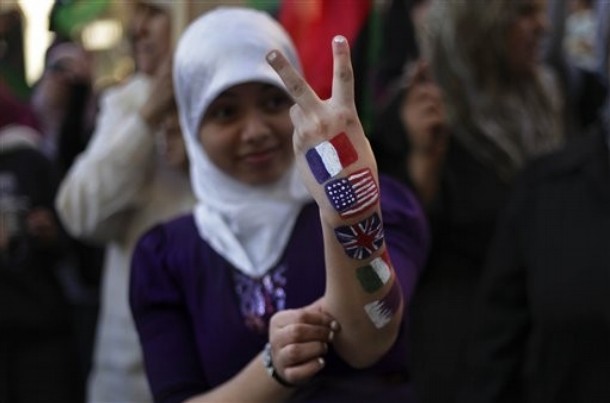
From Max Hastings, the Financial Times: [M]ore decisions on Libya will soon be required. A 60-day review of the Nato mandate is due on 31 May, a 90-day review on 30 June. Officers are drafting options for their political masters, amid the yawning gap between military means and declared ends that has been apparent from the outset. . . .
Washington’s view, embracing the administration and military chiefs, is that if the Europeans wish to save the Libyans from their own ruler, a continent with an economy as large as that of the US should be able to pursue that objective with its own armed forces. The fact that only two of the large Nato European nations’ aircraft are engaged confirms every US prejudice about Europe’s military debility. While Norwegian and Danish aircraft are manfully achieving a higher hits-per-sortie ratio than the British and French, and the Belgians are also bombing, the Germans, Italians and Spanish are nowhere to be seen.
Under heavy pressure from David Cameron, the Americans are still providing resources to enforce the no-fly zone. But there is absolutely no appetite in Washington for extending this commitment, and a potential for real anger towards the British and French governments if the story ends in tears.
Military chiefs on both sides of the Atlantic acknowledged a moral imperative to act to halt the slaughter of innocents in Benghazi. But they remain baffled about why Barack Obama, Mr Cameron and Nicolas Sarkozy chose to go much further, and declare an unequivocal commitment to regime-change. As military attrition and economic pressure weaken Col Gaddafi’s grip, there will be scope for a political deal and de facto partition. But air power alone is unlikely to enforce a decisive rebel victory. The threat or deployment of ground forces is an essential element of campaigns of this kind, yet there are neither the soldiers nor the political will for this.
I still believe Col Gaddafi will fall. My worry is Nato’s implicit acceptance of responsibility for what follows.
The writer is an FT contributing editor. Correction: An earlier version incorrectly attributed this article to Max Boot instead of Max Hastings. (photo: AP)
Image: ap%205%2015%2011%20arm%20painted%20with%20flags.jpg
